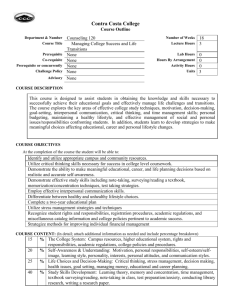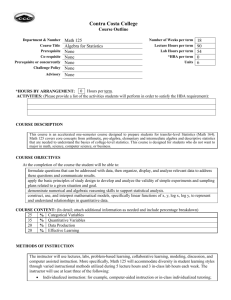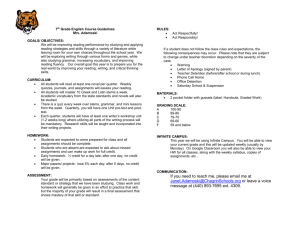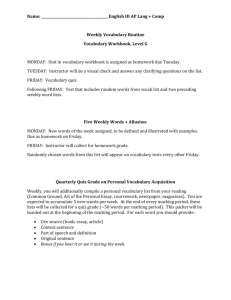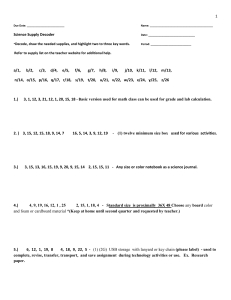Learn Smart Study Module
advertisement
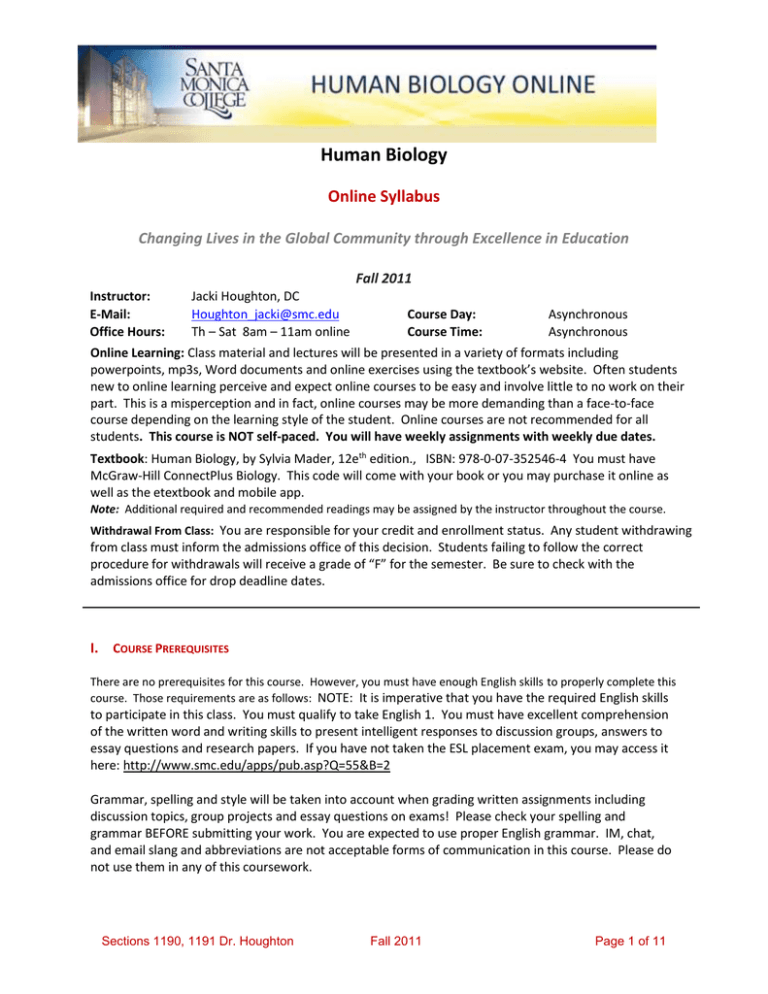
Human Biology Online Syllabus Changing Lives in the Global Community through Excellence in Education Fall 2011 Instructor: Jacki Houghton, DC E-Mail: Houghton_jacki@smc.edu Course Day: Asynchronous Office Hours: Th – Sat 8am – 11am online Course Time: Asynchronous Online Learning: Class material and lectures will be presented in a variety of formats including powerpoints, mp3s, Word documents and online exercises using the textbook’s website. Often students new to online learning perceive and expect online courses to be easy and involve little to no work on their part. This is a misperception and in fact, online courses may be more demanding than a face-to-face course depending on the learning style of the student. Online courses are not recommended for all students. This course is NOT self-paced. You will have weekly assignments with weekly due dates. Textbook: Human Biology, by Sylvia Mader, 12eth edition., ISBN: 978-0-07-352546-4 You must have McGraw-Hill ConnectPlus Biology. This code will come with your book or you may purchase it online as well as the etextbook and mobile app. Note: Additional required and recommended readings may be assigned by the instructor throughout the course. Withdrawal From Class: You are responsible for your credit and enrollment status. Any student withdrawing from class must inform the admissions office of this decision. Students failing to follow the correct procedure for withdrawals will receive a grade of “F” for the semester. Be sure to check with the admissions office for drop deadline dates. I. COURSE PREREQUISITES There are no prerequisites for this course. However, you must have enough English skills to properly complete this course. Those requirements are as follows: NOTE: It is imperative that you have the required English skills to participate in this class. You must qualify to take English 1. You must have excellent comprehension of the written word and writing skills to present intelligent responses to discussion groups, answers to essay questions and research papers. If you have not taken the ESL placement exam, you may access it here: http://www.smc.edu/apps/pub.asp?Q=55&B=2 Grammar, spelling and style will be taken into account when grading written assignments including discussion topics, group projects and essay questions on exams! Please check your spelling and grammar BEFORE submitting your work. You are expected to use proper English grammar. IM, chat, and email slang and abbreviations are not acceptable forms of communication in this course. Please do not use them in any of this coursework. Sections 1190, 1191 Dr. Houghton Fall 2011 Page 1 of 11 Your grade is dependent upon your communication skills! I advise you to drop this class and take English if you think that you will have a problem. II. COMPUTER SKILLS Skills in computer keyboarding, competency in Microsoft Word, email, including sending and receiving attachments, the Internet using a Web Browser. You must take the eCompanion Tutorial at www.smconline.org Sign in and you will see the tutorial. III. CATALOGUE DESCRIPTION Transfer: UC, CSU IGETC AREA 5B (Biological Sciences non-lab) This survey course explores the principles of biology using humans as examples. It includes introductions to the scientific method, cell biology, heredity, evolution, human ecology, behavior, and the major concepts of structure, function and pathology of most organ systems. The course may serve as an introduction to the future study of biology, including anatomy and physiology, or stand by itself as a non-lab life science course for general education students. IV. COURSE DESCRIPTION This human biology course explores the principles of biology using humans as examples. It includes an introduction to the scientific method, cell biology, heredity, evolution, human ecology, behavior and the major concepts of structure, function and pathology of most organ systems. The course may serve as an introduction to the future study of biology, including anatomy and physiology or stands by itself as a non-lab life science course for general education students. V. COURSE OBJECTIVES This course will: Objective # 1 2 3 4 5 6 7 8 Objectives Correlate and understand the general biological concepts Describe the scientific method Describe the mechanisms of the human body functions as they are organized around the central dogma of homeostasis Develop a better understanding of science Understand the principles of critical thinking and be able to apply them Use biological terms and names appropriately Exhibit factual knowledge about major human biological systems Show appreciation for the role of human life in the larger framework of global ecology and the evolutionary history of life on earth VI. COURSE FORMAT / INSTRUCTIONAL METHODS Four primary instructional methods will be used in the course: (1) critical discussions (2) experiential virtual online exercises; (3) reading (4) weekly reflection of concepts learned. Each chapter has an outline, a powerpoint 1190, 1191 Dr. Houghton Fall 2011 Page 2 of 11 presentation, an mp3, a learning module and a quiz. This should be enough different methods available to you to obtain the learning desired. VII. STUDENT LEARNING OUTCOMES Student learning for this course: 1 Identify the exact steps which are involved in scientific discovery and be able to arrange these steps in their proper order. Identify the dependent and independent variable in an experiment and also be able to name and identify the “control” and “experimental” groups from a biologic experiment 2 Identify the basic human biologic systems and their primary functions. Provide current examples from our environment, nutrition and medicine, which can affect these biologic systems and then predict possible health outcomes associated with these specific examples. Student Learning Outcomes Identify the exact steps which are involved in scientific discovery and be able to arrange these steps in their proper order. Identify the dependent and independent variable in an experiment and also be able to name and identify the “control” and “experimental” groups from a biologic experiment Identify the basic human biologic systems and their primary functions. Provide current examples from our environment, nutrition and medicine, which can affect these biologic systems and then predict possible health outcomes associated with these specific examples. VIII. Method of Assessment Course Participation Students will participate in Group Projects based on the SLOs to assess understanding of each of the outcomes. Students will also take objective quizzes and exams to determine level of understanding. COURSE ASSIGNMENTS, DUE DATES & GRADING Weekly Assignments 1) Week 1 Learn Smart Study Module Chapter 1 Quiz Chapter 1 Weekly Journal Entry Post on discussion board your understanding of student pledge 1190, 1191 Dr. Houghton Fall 2011 Point Value Due Date 20 10 5 9/4/11 midnight % of Final Grade 2 1 .5 Page 3 of 11 Point Value Due Date % of Final Grade 2 )Week 2 Learn Smart Study Module Chapter 2 Quiz Chapter 2 Weekly Journal Entry 20 10 5 9/11/11 midnight 2 1 .5 3) Week 3 Learn Smart Study Module Chapter 3 Quiz Chapter 3 Weekly Journal Entry Discussion 1 20 10 5 15 9/18/11 midnight 2 1 .5 1.5 9/25/11 midnight 2 1 .2 8.8 10/2/11 midnight 2 1 .5 10/9/11 midnight 2 1 .5 1.5 10/16/11 midnight 2 1 .5 4.4 10/23/11 midnight 2 1 .5 8.8 10/30/11 midnight 2 1 .5 1.5 Weekly Assignments 4) Week 4 Learn Smart Study Module Chapter 4 Quiz Chapter 4 Weekly Journal Entry Exam 1 Chapters 1 - 4 5) Week 5 Learn Smart Study Module Chapter 5 Quiz Chapter 5 Weekly Journal Entry 6) Week 6 Learn Smart Study Module Chapter 6 Quiz Chapter 6 Weekly Journal Entry Discussion 2 7) Week 7 Learn Smart Study Module Chapter 7 Quiz Chapter 7 Weekly Journal Entry Group Project 1 8) Week 8 Learn Smart Study Module Chapter 8 Quiz Chapter 8 Weekly Journal Entry Exam 2 Chapter 5 - 8 9) Week 9 Learn Smart Study Module Chapter 9 Quiz Chapter 9 Weekly Journal Entry Discussion 3 1190, 1191 Dr. Houghton Fall 2011 Page 4 of 11 Weekly Assignments Point Value 10) Week 10 Learn Smart Study Module Chapter 1 0 Quiz Chapter 10 Weekly Journal Entry 11) Week 11 Learn Smart Study Module Chapter 11 Quiz Chapter 11 Weekly Journal Entry 12) Week 12 Learn Smart Study Module Chapter 12 Quiz Chapter 12 Weekly Journal Entry Discussion 4 Exam 3 Chapter 9 - 12 13) Week 13 Learn Smart Study Module Chapter 13 Quiz Chapter 13 Weekly Journal Entry 14) Week 14 Learn Smart Study Module Chapter 15 Quiz Chapter 15 Weekly Journal Entry 15) Week 15 Learn Smart Study Module Chapter 18 Quiz Chapter 18 Weekly Journal Entry Group Project 2 Due Date % of Final Grade 11/6/11 midnight 2 1 .5 11/13/11 midnight 2 1 .5 11/20/11 midnight 2 1 .5 1.5 8.8 11/27/11 midnight 2 1 .5 12/4/11 midnight 16) Week 16 Learn Smart Study Module Chapter 21 Quiz Chapter 21 Weekly Journal Entry Final Exam Chapters 13, 15, 18 and 21 2 1 .5 12/11/11 midnight 2 1 .5 4.4 12/18/11 midnight Final Due 12/20 at midnight 2 1 .5 8.8 Each of the major assignments is described below. Learn Smart Study Module You must sign onto the Textbook’s “Connect” website and enter our class. Instructions: go to: http://connect.mcgraw-hill.com/class/j_houghton_fall_2011 Here you may buy direct access or use the code in your textbook. You also have the option of buying the etextbook. They also have mobile options. These learning modules are worth 20 points each. Due: These modules are due on the Sundays at midnight in the week in which they are assigned. This assignment is in place to assure that the student is exposed to the assigned material and is assessed. 1190, 1191 Dr. Houghton Fall 2011 Page 5 of 11 Quizzes: The quizzes are also on the “Connect” website. They are all encompassing (uses all of the material presented), are 10 questions in length and are worth 1 point each or 10 points total. Due: These quizzes are due on the Sundays at midnight in the week in which they are assigned. This assignment assesses understanding on different Bloom levels. Exams: We will be using ExamGuard on all exams. You must go to exam 1 during week 1 and download the examguard software and test it. WARNING: if you use another computer to take an exam, you will have to download examguard on that computer which may take time and may not work. You are responsible for having a computer on which examguard works. I have supplied a few practice quizzes for you to test the software. Exams will be a combination of M/C, T/F, fill-in, short answer and essay. Weekly Journal Assignment. On the top menu bar in your eCompanion Course is a link called “Journal”. When you click this link, you will be presented with a page which allows you to place text into a box. Here you will write the following: Each post will include and are worth 1 point each: 1 point: 1. Which topics studied are you most interested in? Which resources did you use this week? (ppt, outline, practice quiz, mp3, textbook website, discussion board etc) 1 point: 2. How did you like the Discussion topic of the week? 1 point 3. What would you do to help a student learn the concepts presented this week? 1 point: 4. Describe the work you did on your Group Project. 1 point: 5. Tell me about one particular piece of information that you learned this week that you will remember forever. Due: These entries are due on the Sundays at midnight in the week in which they are assigned. Discussions: Discussion topics are posted every week. Please take these assignments seriously because 1 point can change your grade. A Rubric appears on all discussion pages to help you with your posts. Group Projects: Directions for completing the Group Project are on the Course Home Link. This is a difficult effort for it requires the cooperation of your group members. IX. Academic Dishonesty READ CAREFULLY! Santa Monica College is strongly committed to the promotion of high ethical standards. Such standards can best be accomplished in an environment where honesty and integrity are practiced. For this reason the College strongly condemns academic dishonesty. Academic dishonesty includes cheating, plagiarism or other improper appropriation of another’s work as one’s own and falsifying records to advance one’s academic standing. Cheating includes but is not limited to copying answers, stealing and/or disseminating tests or answer keys, using your textbook, other books, internet, cell phone or any other source while taking exams, using someone else’s data in preparation of reports or assignments, and assisting others in such practices. Plagiarism involves the presentation of another person’s words, ideas, 1190, 1191 Dr. Houghton Fall 2011 Page 6 of 11 or work as one’s own. It includes but is not limited to copying any material (written or non-written) without proper acknowledgement of its authorship. X. Consequences of Cheating or Plagiarizing If you are caught cheating or plagiarizing on an assignment or exam, you will receive a zero on that assignment. You will also be reported to the campus disciplinarian for review. Any further infraction will result in you being dropped from the class. I am well aware of cheating rings, websites that give answers to exams, students allowing someone else to access their course and completing coursework for them etc. I strongly advise you not to engage in these activities as they may lead to a record of dishonesty which may prevent you from transferring to a University. Your future depends upon your honesty. I also am aware that students post information about classes and instructors and the activities that are expected in them. Beware of using these resources. Classes are changed each semester to prevent students from stealing information from a prior semester. I am here to assure that you receive the best education while watching over your moral activities. XI. Course Expectations and Guidelines Students are expected to contribute to the development of a positive learning environment and to demonstrate their learning through all assignments and through active class participation in discussions and group projects. This participation should consist of thoughtful, respectful, and meaningful contributions based on having completed required and independent readings and assignments prior to posting. Expectations: 1. 2. Students are expected to do the assigned readings and assignments weekly. Students are expected to follow the Student Pledge: DISTANCE EDUCATION STUDENT PLEDGE The following pledge will help you exercise academic integrity as a distance education student and avoid possible violations. 1. I will not divulge my username or password in order that a student/person could be represented as me during an online exam or course assignment. 2. I will not divulge my username and/or password for paid internet websites that may have answers or essays to use as my own work. 3. I will not refer to my textbook, notes, internet, cell phone, person or any other resource while taking an online exam or assignment. 4. I will not divulge the content of an online exam or access another student's coursework in order to complete assignments or exams. 5. I will not copy and/or provide another student with test questions or answers AT ANYTIME! 1190, 1191 Dr. Houghton Fall 2011 Page 7 of 11 6. I will not copy any material without properly footnoting or citing according to my Instructor's citation preference (see Citing Sources link on the Course Home Page) 7. I will not provide answers to another student during an exam, such as using an online communication tool to send/receive answers. 8. I will not take an exam for another student. 9. I will not purchase any academic paper and submit it as my work. 10. I will not allow anyone to know my username and password to eCompanion 11. I will not email the class or any student asking for answers to questions at anytime! 12. I will not use the cell phone while taking an exam! 13. I understand that cheating and plagiarism are egregious offenses and are not tolerated at SMC. 14. I understand that there is a NO TOLERANCE policy at SMC and if I am caught cheating or plagiarizing, I may receive a zero on the assignment or exam, I may be dropped from the class and/or I may be expelled from the college. 15. I have read the syllabus completely and agree to all statements. 16. I have read STUD101 Student Rules & Regs located on the Course Home Page and agree to it's covenants. 17. I have read the Student Code of Conduct on the Course Home Page and agree to it's covenants. 18. I understand that if my English is insufficient to understand the nuances of these documents, I am still obliged to obey them. If there are any words that you do not understand, or and of the above rules are unclear, you MUST post them on the board and I will answer them. Netequette Rules: These rules are in place to remind you that we are all real people and should be treated with the utmost respect. Rule 1: Remember the Human Being who you are addressing Rule 2: Adhere to the same standards of behavior online that you follow in real life Rule 3: Know where you are in cyberspace Rule 4: Respect other people's time and bandwidth Rule 5: Make yourself look good online Rule 6: Share expert knowledge Rule 7: Help keep flame wars under control Rule 8: Respect other people's privacy Rule 9: Don't abuse your power Rule 10: Be forgiving of other people's mistakes For further information on each rule, go to: http://www.albion.com/netiquette/corerules.html 1190, 1191 Dr. Houghton Fall 2011 Page 8 of 11 XII. EMAIL PROTOCOL In this age of texting, proper English has been ignored. No texting language will be accepted! This is college and I insist that you follow the following protocol when emailing: You must begin with Hello or Dear Dr. Houghton. You must sign your email with your real name. I will accept NO email from a private email address. All email sent to me must be sent from the eCompanion website! All other email will be ignored. XIII. GRADES Grades are written in stone! Under NO circumstances are you to email me in the last week or after the course has ended and ask me how you can raise your grade! You must earn your grade as you go along. Take all assignments seriously! Grades are 90%+ = A, 80-89 = B, 70-79 = C, 60-69 = D, <60 = F Assessment Exams Modules Quizzes Discussions Group Projects Journal Entries XIV. Number 4 16 16 4 2 16 Points 100 20 10 15 50 5 Total 400 320 160 60 100 90 1130 % 35 28 14 5 9 8 100 COMPUTER PROBLEMS It is a requirement of this class that you have a working computer and internet connection. Computer related problems are never a valid excuse for not completing or submitting an assignment on time, therefore it is advisable to complete the assignments early enough to take into account any problems that may occur. Late assignments will NOT be accepted, unless for a reason deemed valid by the instructor. If you have a problem during an exam, you must immediately take a screenshot which includes the time stamp in the lower right corner of the computer screen. Then you must email this screenshot to tech support (link at top of page) and cc me with the email which details your problem. I will make my assessment as to whether or not to give you more time based on following this protocol exactly! For all other problems you can email the helpdesk at the link at the top of the page and be sure to cc me so that I can know what is going on. While taking an exam you MUST hit the SUBMIT button when you are finished with the exam or you will not be able to view your results! Leave enough time to do this. If the exam closes before you submit, you will NOT be able to see your responses and the correct answers! XV. HOW TO GET AN A IN THE CLASS You can earn an A in this class! Here is the procedure: sign into the class at least 3 times a week to read the discussion board, view powerpoint presentations, check announcements, go to your Group Project Discussion Board and complete all assignments as given. Participate in your group project. Take the 1190, 1191 Dr. Houghton Fall 2011 Page 9 of 11 exams by the assigned dates. Download and listen to the mp3s. If you need further clarification, refer to your textbook and the textbook’s website. An A student is responsible and diligent! XVI. MY COMMITMENT TO YOU As your instructor, I take this responsibility very seriously. I promise to be responsive to your needs as students and adult learners. I Promise the Following: 1. 2. 3. 4. 5. 6. To communicate with you via the discussion groups at least 2 times per week. To provide extra learning’s if you are challenged by a subject. Exams will be graded on the Monday following exams Discussions will be graded on Mondays Group Projects will be graded in the week following submission Journals will be graded after the semester ends. All entries are dated. No late entries accepted. XVII. WITHDRAWAL FROM CLASS You are responsible for your credit and enrollment status. Any student withdrawing from class must inform the admissions office of this decision. Students failing to follow the correct procedure for withdrawals will receive a grade of “F” for the semester. Be sure to check with the admissions office for drop deadline dates. Any student requesting academic accommodations based on a disability is required to register with Disability Services and Programs (DSP) each semester. A letter of verification for approved accommodations can be obtained from DSP. Please be sure the letter is emailed to the instructor as early in the semester as possible. XVIII. STATEMENT ABOUT INCOMPLETES The Grade of Incomplete (IN) can be assigned only if there is work not completed because of a documented illness or some other emergency occurring after the 12th week of the semester. Students must NOT assume that the instructor will agree to the grade of IN. Removal of the grade of IN must be instituted by the student and agreed to be the instructor and reported on the official “Incomplete Completion Form.” XIX. POLICY ON LATE OR MAKE-UP WORK You may NOT submit late work. If a serious problem arises, you must email me IMMEDIATELY with the circumstances. I will advise on an individual basis what to do. If you have a problem while taking an exam, you must immediately take a screenshot which includes the time stamp. Then, immediately click the tech support link at the top of the page and email tech support with the details of your problem. Cc me with your email. Wait for our responses. THIS IS THE ONLY METHOD TO USE TO BE GRANTED ADDITIONAL TIME TO COMPLETE YOUR EXAM! XX. POLICY ON CHANGES TO THE SYLLABUS AND/OR COURSE REQUIREMENTS It may be necessary to make some adjustments to the syllabus during the semester in order to respond to unforeseen or extenuating circumstances. Adjustments that are made will be communicated to students in writing. XXI. COMPLAINTS If you have a complaint or concern about the course or the instructor, please discuss it first with the instructor. If you feel you cannot discuss it with the instructor, contact the chair of the department. 1190, 1191 Dr. Houghton Fall 2011 Page 10 of 11 XXII. TIPS FOR MAXIMIZING YOUR LEARNING EXPERIENCE IN THIS COURSE Be mindful of getting proper nutrition, exercise, rest and sleep! Come to the virtual class. Complete required readings and assignments BEFORE posting. Participate in class discussions. If you don't understand something, ask questions! Ask questions, during office hours, and/or through email! Keep up with the assigned readings and assignments. Don’t procrastinate or postpone working on assignments. 1190, 1191 Dr. Houghton Fall 2011 Page 11 of 11
